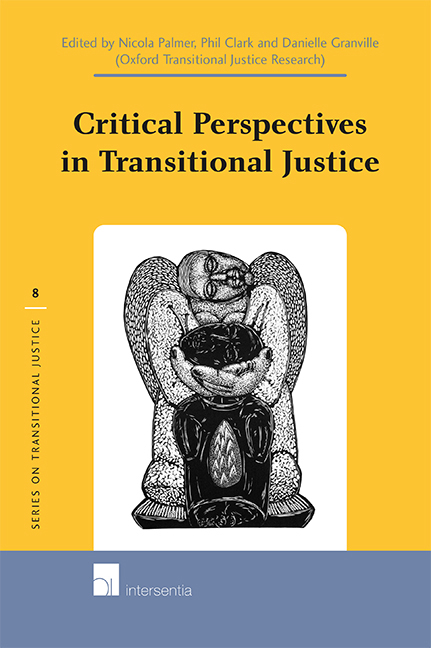Book contents
- Frontmatter
- Note
- Acknowledgements
- Contents
- Abbreviations
- Introduction
- Section 1 Critiquing Core Concepts in Transitional Justice
- Section 2 Accountability, Human Rights and the Rule of Law
- Section 3 Locality and Legitimacy
- Section 4 Memory, Ritual and Apology
- Section 5 Transitional Justice After Transition
- Contributors’ Biographies
- Series on Transitional Justice
12 - Legitimacy, Power and Memory at the Extraordinary Chambers in the Courts of Cambodia
Published online by Cambridge University Press: 22 December 2020
- Frontmatter
- Note
- Acknowledgements
- Contents
- Abbreviations
- Introduction
- Section 1 Critiquing Core Concepts in Transitional Justice
- Section 2 Accountability, Human Rights and the Rule of Law
- Section 3 Locality and Legitimacy
- Section 4 Memory, Ritual and Apology
- Section 5 Transitional Justice After Transition
- Contributors’ Biographies
- Series on Transitional Justice
Summary
INTRODUCTION
The Extraordinary Chambers in the Courts of Cambodia (ECCC) were established in 2006 to prosecute crimes perpetrated during the Democratic Kampuchea (DK) ‘Khmer Rouge’ (KR) regime (1975–1979), under which an estimated 1.7 million people perished due to disease, malnutrition and starvation. As one of a recent movement toward ‘mixed’ tribunals, established as part-internationalised bodies within existing domestic legal structures, the ECCC is purported to offer a credible internationalised response to Cambodia's troubled past, while maintaining a strong sense of domestic public ownership over proceedings. As of April 2010, four senior KR leaders and ‘Duch’, the head of the Tuol Sleng ‘S-21’ detention and execution centre, had been charged with crimes against humanity and war crimes, with the first trial of Duch nearing conclusion. Important procedural questions are currently being asked about the ability of the court to meet international standards of fairness, transparency and independence. The Cambodian judiciary is weak, and the ECCC has recently been embroiled in allegations of (administrative) corruption. Moreover, serious criticism has been voiced concerning ongoing political interference by the Cambodian government. These concerns have led some commentators to raise doubts over the legitimacy of the ECCC as a ‘free and fair’ mechanism for the dispensation of international justice, in accordance with established international legal norms and standards.
In this chapter, I approach questions of legitimacy at the ECCC from a different perspective. I suggest that beyond questions of legal procedural standards, we must also be attentive to the particular social and cultural politics of memory that the ECCC implicates as it seeks to garner public legitimacy within Cambodia. This relates to important questions about the extent to which Cambodians feel a sense of ownership toward the ECCC, the ways in which Cambodians feel invested in the ECCC process, and the ability of the ECCC proceedings to reflect and validate socially and culturally embedded experiences and memories of suffering.
Conversely, and more critically, I scrutinise the actions of the ECCC in relation to these questions: how does the ECCC entice public support? How does the ECCC engage and involve local communities? To what extent does the ECCC subordinate, marginalise, reconfigure or impose upon socially and culturally embedded experiences and memories of pain?
- Type
- Chapter
- Information
- Critical Perspectives in Transitional Justice , pp. 217 - 234Publisher: IntersentiaPrint publication year: 2012
- 2
- Cited by

